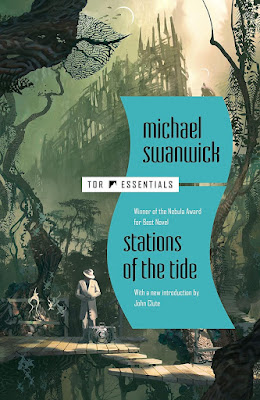.
The Best of Michael Swanwick Volume Two is a finalist for the Locus Awards in the Best Collection category! This is an honor worth celebrating and I'm doing so now because there's not much chance my book will win. I say that without any self-pity whatsoever. Or modesty, come to think of it. But in the forty-nine years the category has been in existence, "Best Of" collections have only won three times--for The Best of Connie Willis, The Best of Gene Wolfe, and The Best of Fritz Leiber.
But there I am, on the slate! As are nine others:
The
Essential Peter S. Beagle, Volumes 1 & 2, Peter S. Beagle (Tachyon)
Zen and the
Art of Starship Maintenance and Other Stories, Tobias S. Buckell (Apex)
The Wishing
Pool and Other Stories, Tananarive Due (Akashic)
White Cat,
Black Dog, Kelly Link (Random House; Ad Astra)
No One Will
Come Back For Us, Premee Mohamed (Undertow)
Jackal,
Jackal, Tobi Ogundiran (Undertow)
Skin Thief,
Suzan Palumbo (Neon Hemlock)
Lost Places,
Sarah Pinsker (Small Beer)
The Best of
Catherynne M. Valente, Volume One, Catherynne M. Valente (Subterranean)
I think you'll agree that's pretty good company to be in.
And elsewhere on the list:
In related news, Alvaro Zinos-Amaro's remarkable book length interview Being Michael Swanwick is a finalist in the Best Non-Fiction category. In case you missed it, this is a series of interviews covering pretty much every work of short fiction I've ever published--where they came from, what I was trying to do with them, seasoned with a dollop of gossip. Alvaro was an extremely insightful interviewer and a most impressive researcher. He definitely deserves an award for this book, although--as one favorable reviewer noted--people who read my short fiction are a niche market.
And up in the same category is The Fiction Writer's Guide to Alternate History by Jack Dann. This is relevant to me because in addition to the more analytical chapters about the nature of alternate history fiction, Jack assembled a round table of writers who have practiced the form, one of whom was me. He then posed questions, stood back, and let us disagree loudly with each other.
I will admit that, reading this book, there were a couple of times when I wished I had been more profound. But the other authors included were Kim: Kim Stanley Robinson, William Gibson, Pamela Sargent, Harry Turtledove,
John Crowley, Michael Bishop, Lisa Goldstein, John Kessel, John
Birmingham, Barry N. Malzberg, Janeen Webb, Bruce Sterling, Mark
Shirrefs, Christopher Priest, Terry Bisson, Mary Rosenblum, Paul Di Filippo, Richard Harland, Howard Waldrop, Lewis
Shiner, and George Zebrowski, so there a lot of things there worth hearing.
There are also eight other books nominated in this category, most of which I have not (alas) read. They are:
42: The Wildly Improbable Ideas of
Douglas Adams, Kevin Jon Davies, ed. (Unbound UK)
Wish I Was Here: An Anti-Memoir,
M. John Harrison (Serpent’s Tail; Saga 2024)
All These Worlds, Niall
Harrison (Briardene)
101 Horror Books to Read Before
You’re Murdered, Sadie Hartmann (Page Street Publishing)
Space Crone, Ursula K. Le
Guin (Silver)
Ex Marginalia: Essays on Writing
Speculative Fiction by Persons of Color, Chinelo Onwualu, ed. (Hydra
House)
A Traveller in Time: The Critical
Practice of Maureen Kincaid Speller, Maureen Kincaid Speller (Luna
Press Publishing)
Owning the Unknown: A Science Fiction
Writer Explores Atheism, Agnosticism, and the Idea of God, Robert
Charles Wilson (Pitchstone)
And who do I think will win . . . ?
I honestly have no idea. Perhaps because in my first decade as a published writer, my work was nominated for major awards over and over and never once won, I've always taken pleasure in the horse-race aspects of these awards. I'd read all the fiction and make my predictions, sometimes based on what deserved to win and other times based on the literary politics going on at that moment. And I was always wrong. Always.
I concluded then that there are so many factors at play in a popularly-voted award that when it comes down to the voting it goes chaotic. Which is why the process is still so much fun to watch.
Meanwhile, if you'd like to buy one of the books discussed here, you may:
The Best of Michael Swanwick Volume 2 may be purchased from Subterranean Press here.
Being Michael Swanwick is currently on sale (three dollars off!) at Fairwood Press here.
And The Fiction Writer's Guide to Alternate History is available from Bloomsbury Publishing here. Although non-UK readers might try a local bookseller to save on postage.
*













